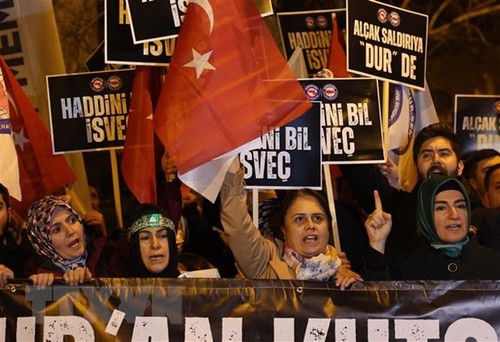 Demonstrations outside the Swedish Embassy in Ankara, Turkey, to oppose the Quran burning on March 21, 2023. (Photo: AFP/ VNA) Demonstrations outside the Swedish Embassy in Ankara, Turkey, to oppose the Quran burning on March 21, 2023. (Photo: AFP/ VNA) |
Burning the Quran is illegal in almost all Muslim countries and the violator could receive a death penalty in some countries that continue to carry out executions. The UN Human Rights Council’s the emergency meeting will be convened at the request of Pakistan, representing some members of the Organization of Islamic Cooperation (OIC) who are members of the Council. The Council will discuss the alarming increase in acts of religious hatred and Quran offending in certain countries.
The Muslim community in high dudgeon
 Salwan Momika, an Iraqi refugee in Sweden, burns a copy of the Quran in Stockholm. (photo: AFP) Salwan Momika, an Iraqi refugee in Sweden, burns a copy of the Quran in Stockholm. (photo: AFP) |
The Muslim world's fury was sparked in recent days when Salwan Momika, an Iraqi refugee in Sweden, burned a version of the Quran in Stockholm on June 28, the first day of the Eid al-Adha holiday of the Muslim community.
Turkey, Morocco, Iraq, Pakistan, Kuwait, and Iran strongly condemned the act. On his personal Twitter account, Turkish Foreign Minister Hakan Fidan condemned the Swedish authorities for allowing anti-Muslim actions to take place, calling it ‘unacceptable’.
Iraq, Kuwait, the United Arab Emirates (UAE), Morocco, and Jordan summoned their Swedish ambassadors to lodge a protest and demand an end to all direct action against international efforts to spread tolerance and moderation.
Iran postponed the appointment of an Ambassador to Sweden. Several other Muslim countries criticized the Swedish government for allowing people like Momika to insult Islam in the name of freedom of speech.
Last Sunday, the Organization of Islamic Cooperation based in the UAE called on its members to take collective action to avoid a recurrence of the offending behavior.
UN Secretary-General Antonio Guterres condemned the incident and said measures must be taken to prevent further anti-Muslim acts.
The European External Affairs Service said that the burning of the Quran by an individual in Sweden did not reflect the EU’s viewpoint. The EU condemned this act and called for avoiding an escalation of violence.
Facing the risk of new diplomatic retaliation and also wanting to avoid trouble related to joining NATO, the Swedish Minister of Foreign Affairs said he considers burning the Quran an anti-Islamic act and Sweden has no place for racism, xenophobia, and intolerance, although the Swedish Constitution protects freedom of speech.
Deepening disagreements between the Muslim world and European society
The recent Quran burning in Sweden is not the first case to anger the Muslim world. In September 2005, a major Danish daily published 12 cartoons featuring the Prophet Muhammad, which led to several months of Muslim anger.
In February 2012, large demonstrations occurred in Afghanistan to protest the burning of the Quran by US soldiers. The same year, the film "Muslim Innocence" produced by an American allegedly defamed the Prophet Muhammad and provoked a backlash.
French satirical magazine Charlie Hebdo circulated cartoons mocking the Muslims in 2015, leading to a shooting at its headquarters in Paris which killed 12 people and injured 11 others.
The limit of Western-style personal freedom is questioned again as it creates potential problems. The incident is a blow to already strained relations between Turkey and Sweden, who has applied to join NATO but is opposed by Turkey. Such actions have created countless conflicts between the Muslim world and European societies, fueled anti-Islamism, extremist ideologies, and terrorism, and sowed the seeds of hatred and violence around the world. The incident could become an excuse for radical Islamic groups, including "lone wolf" terrorists, to reactivate in the heart of Western societies.